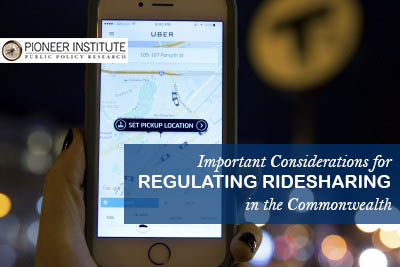Study: State Ridesharing Regs Should Focus More on Consumer Preferences, Less on Protecting Cab Companies
BOSTON – Legislation recently approved by the Massachusetts House to create a new Ride for Hire Division within the state Department of Public Utilities to regulate Transportation Network Companies (TNCs) like Uber, Lyft and Fasten includes a number of fair and sensible protections for TNC customers, but goes too far to protect the outdated system of taxi medallions controlled by government regulators, according to a new Pioneer Institute policy brief.
“Massachusetts should reform the medallion system to authorize a class of cab permits that would provide new market entrants with flexibility and low start-up costs,” said Pioneer Research and Operations Associate Matt Blackbourn, who co-authored “Important Considerations for Regulating Ridesharing in Massachusetts” with Research and Outreach Intern Brendon Murphy. New York City introduced a similar system several years ago.
Blackbourn and Murphy argue that more consideration should be given to consumer preferences in high-volume areas. They cite a provision in the House legislation that would prohibit TNCs from making pick-ups at Logan Airport and the Boston Convention and Exhibition Center through 2021, even as it would allow Cambridge and Somerville cabs to service those areas when Boston taxi availability is limited.
“The provision restricts consumer choice and limits competition in the interest of protecting cab companies,” said Pioneer Executive Director Jim Stergios.
The bill would require that the Massachusetts Growth Capital Corporation (GCC) create a Ride for Hire Sustainability Program to support smaller cab firms and dedicate “not less than 10 percent of the capital committed by the corporation” annually to provide financial assistance, working capital and lines of credit to bolster cab companies. TNCs would not be eligible for this assistance.
It would also authorize the GCC to provide loan guarantees for the purchase of taxi medallions. Medallions sold for about $700,000 as recently as March of 2014, but the average cost is now about half that. Loan guarantees mean the public would assume the risk if medallion prices rise too much and the popularity of TNCs continues to grow, leaving purchasers unable to pay back what they borrowed.
The GCC was created in 2010 to “preserve and create jobs at small businesses, women and minority-owned businesses, and to promote economic development in underserved, gateway municipalities and low and moderate income communities.” The requirement to commit so many resources to cab companies could divert them from some of the most underserved areas in Massachusetts.
Among the sensible consumer protections in the bill is one that would limit TNCs’ ability to increase prices during periods of high demand, a practice known as “surge pricing.” One Uber rider disclosed that he was charged $1,110 for a ride on New Year’s Eve.
The bill would prohibit TNCs from charging “excessive minimum rates or base rates” except during “a state of emergency.” The report authors call on the Legislature to better define what it means by a state of emergency as well as what it considers excessive minimum and base rates.
Matthew Blackbourn is Pioneer’s research and operations associate. He has led projects for the Institute’s Center for Better Government, Center for Economic Opportunity and Health Care Initiative, and assists with managing the organization’s crowdsourcing initiative, the Better Government Competition. He holds a Bachelor of Arts in Political Science and Philosophy from Tulane University, where he was elected to Phi Beta Kappa and graduated summa cum laude.
Brendon Murphy is research and outreach intern at Pioneer. He is a senior at Stonehill College in Easton, MA, where he plans to earn a Bachelor’s in Economics and Marketing this spring.
###
Pioneer Institute is an independent, non-partisan, privately funded research organization that seeks to improve the quality of life in Massachusetts through civic discourse and intellectually rigorous, data-driven public policy solutions based on free market principles, individual liberty and responsibility, and the ideal of effective, limited and accountable government.



